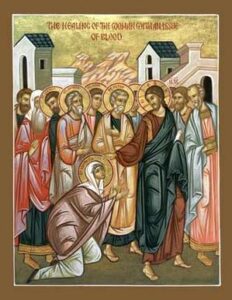 1st Sunday after Trinity 2023 St Andrew’s Milngavie
1st Sunday after Trinity 2023 St Andrew’s Milngavie
Today we celebrated the first Sunday after Trinity. To our great delight we welcomed Gordon and Pamela. It was lovely to have them both back in church again.
Many thanks to all who helped spring clean the church yesterday. We were a cheerful team, and the church now looks fresh and sparkling.
On Thursday 6pm the new Rector for All Saints, the Reverend David Guest, is being installed. Everyone is most welcome to come to the service so please do come along and support him and the congregation.
This Week
Tuesday – 10am Prayer Group in the Garden Room
Thursday 10am – Said Holy Communion followed by coffee in Friendship House
Thursday 6pm – Installation of the Reverend David Guest at All Saints
Readings for next Sunday – 2nd Sunday after Trinity – Exodus 19:2-8 Romans 5:1-8 Matthew 9:35:10:8
Today’s reading – Hosea 5:15-6:6, Romans 4:13-25, Matthew 9:9-13,18-26
Today is the first Sunday after Trinity, the first Sunday of ordinary Time when having celebrated all the major festivals of Christmas and Easter we return to the active earthly everyday ministry of Jesus – which is of course described so beautifully in the gospels.
This year we hear the account of Jesus’ ministry through the eyes of Saint Matthew, the apostle, who would have witnessed first-hand the teachings, miracles and what it must have been like to be a follower of Christ.
Today we begin with the story of Matthew’s calling to follow Jesus and then, with people gathered to listen to Jesus, we hear how he is summoned to the bedside of a gravely ill girl, and on the way there, he heals a woman who had suffered haemorrhages for 12 years.
These two accounts immediately remind us how Jesus’ ministry focuses on all people, regardless of status, wealth, age or sex. Tax collectors were regarded as sinners, the rulers were wealthy Romans viewed with suspicion, women, children and especially girls were nonentities. But in Jesus’ eyes they were all in need of his love and attention.
Jesus realised that Matthew was important in his own right as a tax collector. With a Roman soldier on either side, he had the right to enforce the taxes and the means to make a bit for himself. But to his own people he would have been a traitor, a disgrace to his family and he certainly may not have been welcome in a synagogue.
Next, we encounter a leader of the synagogue -Mark and Luke name him Jairus but Matthew doesn’t provide that detail. His daughter has died. He searches for someone who might be able to help him. But in the first century, who could he ask? Boys were sought after children but not girls in the same way and this poor child is already supposedly dead.
And in the middle of this story, we meet a woman who had been suffering from haemorrhages for 12 years. This bleeding was, no doubt, painful for the women, physically and mentally. But it also likely to have prevented her from marrying and having children. Certainly, it rendered her ritually unclean. She had been robbed of any kind of life but begging.
So, all these people in their different ways were considered “untouchable” by society. As such, they were people without place, future, dignity, and in a very real sense, cut off from life, though only the little girl is dead.
In these stories we see immediately how Jesus removes each of these individuals from their situations and returns them, restores them, to a position of life and dignity again.
He calls Matthew to leave his tax booth and follow him, and Matthew complies. Jesus’ encounter with the bleeding woman, allowing her to touch his robes, rescues her from the disease that consumes her and makes her “well” or “whole” again. The little girl is invited to get up, and she does.
In the end through faith and trust in God, Matthew, Jairus, the women with haemorrhages and the girl all obtained what they sought from the Lord. They were all healed and restored through turning to Jesus.
They turned to Jesus….even in the OT today we hear how Hosea urges his people to turn to the Lord for healing and revival. But we may ask ourselves today, how may we receive God’s love, healing and restoration. How do we turn to Jesus?
Through the media, the news in our world today and personally in our own lives we are constantly confronted by tragedy, disease and situations of catastrophe and disaster. When faced with such things, our only hope is to put them faithfully before God in prayer and supplication, but faith can waver in the face of adversity.
In his ministry Jesus travelled throughout the county side healing many people as they flocked to him in their droves, confident that he could help them and restore them to a full life. They were determined to be seen by him and more importantly to touch him, certain that was all that was required. The woman said to herself, “If I only touch his cloak, I will be healed.” Matthew 9;21
We obviously are unable physically to touch Christ’s robes, but our scripture tells us, Jesus says, “I will not leave you comfortless: I will come to you.” John 14:18
And so, he does come to us. He comes to us in the gift of the Eucharist, the Holy Sacrament that brings his presence to us and through the mysteries of the Holy Spirit touches our souls through the sharing of the bread and wine, drawing our souls to the Lord, where they find healing, renewal, consolation and ultimately eternal rest.
